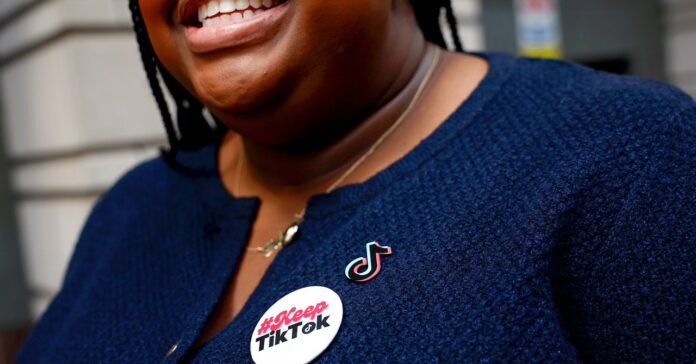A federal appeals court upheld a law that could result in TikTok being banned in the United States by the middle of next month, putting the future of one of the largest social media platforms in the country at risk. Citing national security concerns the Justice Department raised about the Chinese-owned app, a panel of judges on the US Court of Appeals in Washington DC decided in a 3:0 vote that the law could stand and TikTok could still be banned in the United States next year.
“We conclude the portions of the Act the petitioners have standing to challenge, that is the provisions concerning TikTok and its related entities, survive constitutional scrutiny. We therefore deny the petitions,” judge Douglas Ginsburg wrote in the court’s majority opinion on Friday. “Consequently, TikTok’s millions of users will need to find alternative media of communication.”
The case will likely now go to the Supreme Court, which could take it on or allow the appeals ruling to stand. Either way, the decision is likely to present questions for President-elect Donald Trump, who first tried banning TikTok in 2020 but more recently said he opposed the move because it would help the video platform’s competitor, Meta.
“The Supreme Court has an established historical record of protecting Americans’ right to free speech, and we expect they will do just that on this important constitutional issue,” TikTok spokesperson Michael Hughes said in a statement. “Unfortunately, the TikTok ban was conceived and pushed through based upon inaccurate, flawed and hypothetical information, resulting in outright censorship of the American people.”
The Trump transition team and the Department of Justice did not immediately respond to a request for comment from WIRED.
TikTok filed the lawsuit in May after President Biden signed into law the Protecting Americans from Foreign Adversary Controlled Applications Act (PAFACA), which forces ByteDance to sell TikTok’s US operations to a non-Chinese company by January 19 or see its app blocked from app stores in the country. TikTok argued that the law singles out TikTok because of the content on the platform, violating the First Amendment. A coalition of TikTok creators also joined the case, saying that their free speech rights would be infringed upon if over 170 million Americans are forced to leave the platform.
The appeals court ruled today that the PAFACA does not violate TikTok’s free speech rights.
“The Government does not suppress content or require a certain mix of content. Indeed, content on the platform could in principle remain unchanged after divestiture, and people in the United States would remain free to read and share as much PRC propaganda (or any other content) as they desire on TikTok or any other platform of their choosing,” Ginsburg wrote in the majority opinion.
“Congress judged it necessary to assume that risk given the grave national-security threats it perceived. And because the record reflects that Congress’s decision was considered, consistent with longstanding regulatory practice, and devoid of an institutional aim to suppress particular messages or ideas, we are not in a position to set it aside,” the concurring opinion by judge Sri Srinivasan said.
Both the US Department of Justice and TikTok have previously requested an accelerated ruling to come out by today. Since the law is upheld, the TikTok ban could take effect as soon as one day before Trump is inaugurated next month.
In reality, the app is most likely to survive a few more months. A 90-day extension of the deadline remains on the table for the Biden administration, which would leave the issue in Trump’s hands. What’s more certain to happen is that ByteDance would appeal the court decision today and take it to the Supreme Court next, which is expected to take the case and issue its decision later next year.
Friday’s ruling will not come as a surprise to people who have been watching the case. In the oral arguments in front of the Appeals Court back in September, the judges appeared to have already bought the idea that the app poses a valid national security concern for the US. The remaining open question was whether a ban was an overcorrection that caused more relative harm to freedom of speech. The judges said definitively today that the answer to that was no.
“Courts tend to give wide latitude to the executive branch on issues of national security,” says Dewardric McNeal, a former Department of Defense official and the current the managing director of DC-based consultancy Longview Global. While Congress can theoretically repeal the PAFACA Act, it will be a tough case for Trump to convince them to do so because there’s a “large majority of the people on Capitol Hill who supported this law,” McNeal says.
In order to save TikTok, Trump could use powers of the executive branch to his advantage. “While you cannot completely disregard the law, you can decide how heavy you want to focus on the prosecution of the law, and how aggressively you want to execute the law,” McNeal says.
Alan Rozenshtein, an associate professor of law at the University of Minnesota Law School, told WIRED earlier that the PAFACA Act is written so that the US president gets to decide whether TikTok is “no longer being controlled by a foreign adversary.” This carve out could create a legal path for the Trump administration to allow TikTok to continue operating in the US.
An alternative scenario that would allow Trump to avoid causing controversy with his Republican allies in Congress would be brokering a deal for TikTok to be sold to an American investor. At least two prominent bids to buy the app have already emerged, including one from Steven Mnuchin, the former US Treasury secretary, and Frank McCourt, an American real estate investor.
Updated 12/6/24 12:11 pm ET: This story has been updated with comment from TikTok.
Source : Wired








